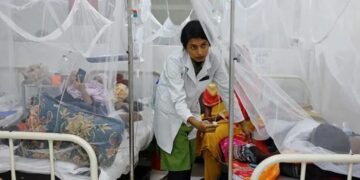On Thursday, Pakistan reported more than 3,000 new coronavirus cases, a 45.5 percent increase from the day before and the first time in nearly four months when daily infections exceeded 3,000.
3,019 additional instances were discovered in the last 24 hours, up from 2,074 on Wednesday. Positive sentiment increased to 6.12% from 4.7 percent the day before.
On September 15, the country had confirmed 3,012 cases.
According to the government’s database for tracking the virus’s spread across the country, the number of active cases has risen to 23,000, up from 17,748 on Monday, with 651 in critical care.
The following is a breakdown of the previous 24 hours across the country:
There were 1,733 cases in Sindh.
919 cases, 1 death in Punjab
64 cases, 3 deaths in Khyber Pakhtunkhwa
11 cases in Balochistan
284 cases in Islamabad
4 cases in Gilgit-Baltistan
4 cases, 1 death in Azad Jammu and Kashmir
The Omicron variant of the coronavirus, which has introduced a fifth wave of the disease to the country, is to blame for the spike in cases.
According to a document obtained by Dawn, Karachi’s positive rate on Wednesday was 20.22 percent, Mirpur’s was 10%, Lahore’s was 7.15 percent, Islamabad’s was 4.46 percent, and Rawalpindi’s was 4.06 percent.
Pakistan reached the milestone of giving at least one dose of the Covid-19 vaccination to over 100 million individuals earlier this week.
“Nearly 75 million people are fully vaccinated, accounting for 33 percent of the overall population and 49 percent of the eligible population. The job isn’t finished yet. It’s important to keep the momentum flowing “According to a statement issued by the NCOC.
Surge is not a surprise.
Dr. Javed Akram, a member of the Covid-19 Scientific Task Force, said the increase was not surprising because individuals were suffering from “pandemic weariness” and had given the virus every opportunity to spread and mutate.
He recommended people to get vaccinated as soon as possible, as the ‘Deltacron’ variety of coronavirus, which has characteristics of both the Delta and Omicron forms, has been reported in Cyprus and is expected to reach Pakistan sooner or later.
“I recommend that people wear masks and keep comorbidities (many illnesses) such as blood sugar and blood pressure under control. They should avoid going out in bad weather, such as early in the morning or late at night. They should have their drivers, watchmen, chefs, and maids vaccinated because they can spread the illness to others,” Dr. Akram had insisted.
Quarantine is no longer centralised.
Meanwhile, the NCOC has promptly discontinued centralised quarantine.
It read: “Inbound travellers who tested positive for Rapid Antigen Testing (RAT) have no longer been subjected to centralised quarantine. All passengers who are found to be positive in RAT upon arrival at airports/border terminals will henceforth be forced to self-isolate for ten days (home quarantine). All inbound passengers who are currently quarantined at central locations will be relocated as needed.”
In light of the recent judgement, the NCOC stated that the remaining protocols of the inbound testing policy will be maintained.
It has mandated that information be forwarded to the appropriate provincial and district governments, and that a procedure be devised to ensure that positive travellers are quarantined at home for ten days.



























